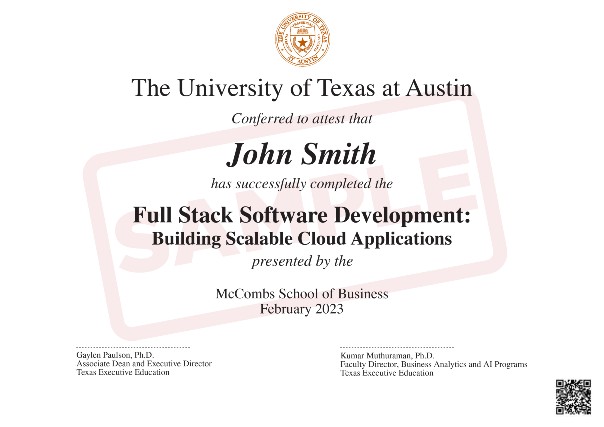Earn your certificate from The University of Texas at Austin
#3
MS BUSINESS ANALYTICS

by QS World University Rankings
#6
EXECUTIVE EDUCATION CUSTOM PROGRAMS

By Financial Times, 2022

Be job-ready by mastering highly relevant tools and technologies
Comprehensive Curriculum
250+
Hours of Learning Content
32
Projects and Assignments
Designed by leading software developers, the curriculum gives you the exposure you need to build full-fledged software solutions with front-end, back-end, and dev-ops capabilities.
Prework: Introduction to Programming [4 Weeks]
Overview of web development
Here, you will learn the foundational concepts of full stack program, including web development and the differences between web and app development. You will explore how webpages serve as the essential building blocks of the internet. Additionally, you will gain an understanding of the evolution from traditional to modern web applications, and the various server-side technologies that power dynamic content on websites.
Server-Side Coding Technologies
Here, you will learn the importance of server-side coding technologies in web development. You will explore how these technologies manage data, handle user requests, and create dynamic web experiences. Understanding the role of server-side code is essential to becoming proficient in full stack software development.
Introduction to MERN Stack
Setting up development environment (Node.js, VS Code)
Installation of VS Code, Github, MongoDB Compass
Here, you will learn how to install essential software, including VS Code for coding, GitHub for version control, and MongoDB Compass for managing your NoSQL database. These tools are critical for modern development workflows, from coding to version control and database management.
Version control with Git and GitHub
Here, you will learn how to use Git for version control and GitHub for collaboration. You will practice key Git operations, such as initializing a repository, pulling changes, committing updates, and pushing your code to GitHub. These skills are fundamental to working efficiently in teams and managing code over time.
Module 1: Basic Web Development and JavaScript Fundamentals [3 Weeks]
HTML, CSS and Bootstrap
Here, you will learn how to build the foundation of a website using HTML, CSS, and Bootstrap. You will discover how to structure content with HTML, style it effectively with CSS, and create responsive, modern layouts using the Bootstrap framework. These skills are essential for any web developer.
Introduction to JavaScript
Here, you will learn the basics of JavaScript, the core programming language for adding interactivity to websites. You will understand fundamental concepts such as variables, data types, and operators, essential for writing functional code and building dynamic web pages.
DOM manipulation with JavaScript
Here, you will learn how to interact with and modify the Document Object Model (DOM) using JavaScript. You will explore techniques for dynamically updating and manipulating HTML elements, which is crucial for building interactive web applications.
Module 2: Deep Dive into JavaScript Essentials [4 Weeks]
Introduction to Node.js and its ecosystem
Here, you will learn about Node.js, an open-source, server-side JavaScript runtime. You will explore how Node.js enables JavaScript to be used for backend development, and how its package ecosystem offers tools to help you build scalable applications quickly and efficiently.
String, arrays and objects
Here, you will learn how to work with essential JavaScript data structures, such as strings, arrays, and objects. These structures are crucial for handling data in your applications, and you will learn how to manipulate them effectively for different use cases.
Functions
Here, you will learn how to define and use functions in JavaScript. You will understand different types of functions, such as function declarations and expressions, and explore concepts like scope and closures, which are important for organizing and optimizing your code.
ES6 features
Here you will learn about the new features introduced in JavaScript ES6 (ECMAScript 2015), such as arrow functions, destructuring, template literals, and more. These modern syntax improvements help make your code cleaner, more concise, and easier to read.
Asynchronous JavaScript
Here you will learn about asynchronous JavaScript and how to handle operations that take time, such as network requests. You will explore callbacks, promises, and async/await to manage asynchronous code and avoid blocking the execution of your program.
JavaScript array methods
Here you will learn about powerful array methods in JavaScript, such as map(), filter(), and reduce(). These methods allow you to process and transform arrays more effectively, making your code more concise and efficient.
Object-oriented programming in JavaScript
Here you will learn the principles of object-oriented programming (OOP) in JavaScript. You will understand how to use classes and inheritance to structure your code, enabling you to create reusable, modular, and scalable applications.
Module 3: Introduction to Node.js [2 Weeks]
Creating a basic server with Node.js
Handling form data and file uploads
Here you will learn how to process form submissions and handle file uploads on the server side using Node.js. This is an essential skill for building web applications that allow users to interact with the server through form inputs and file uploads.
Module 4: Frontend Development with ReactJS [4 Weeks]
Introduction to React.js and its core concepts
Here you will learn the core concepts of React.js, including its component-based architecture and virtual DOM. You will understand how React allows you to efficiently update the user interface by re-rendering only the components that have changed.
Setting up a React development environment
JSX syntax and component-based architecture
Here you will learn JSX, a syntax extension for JavaScript that allows you to write HTML-like code within JavaScript. You will also explore React’s component-based architecture, which lets you create reusable UI components that manage their own state and behavior.
State and props in React
Here you will learn how to manage data in React using state and props. You will understand how to pass data between components using props and how to manage internal component state to make your app interactive and dynamic.
React Hooks
Here you will learn how to use React Hooks, such as useState and useEffect, to manage state and handle side effects in functional components. Hooks simplify code and eliminate the need for class components in many cases.
Handling events and forms in React
Here you will learn how to handle user input and form submissions in React applications. You will gain the skills to manage event listeners, capture form data, and trigger state updates based on user interactions.
Styling in React
Here you will learn how to style React components using various methods, including traditional CSS, CSS-in-JS libraries, and styled-components. You will also explore how to integrate popular styling frameworks like React Bootstrap into your projects.
React Router
Here you will learn how to implement client-side routing in React applications using React Router. You will gain the skills to create multi-page apps and manage dynamic URLs with hooks like useHistory and useParams.
Redux for state management in React applications
Here you will learn how to manage complex state across large React applications using Redux. You will understand how to centralize state management and ensure consistency across various parts of your app.
Redux-thunk for asynchronous actions
Context API and useContext hook
Module 5: TypeScript and Next.js [3 Weeks]
TypeScript intro and setup
Server-side rendering (SSR) with React and Next.js
Next.js performance optimization strategies
Module 6: SQL and Relational Databases [2 Weeks]
Introduction to SQL and relational databases
Here you will learn the basics of SQL and relational databases like PostgreSQL and MySQL. You will explore how data is stored and organized in relational databases, and how to retrieve and manipulate it using SQL queries.
SQL basics
Data modeling and schema design in SQL
Here you will learn how to design efficient database schemas for storing and retrieving data. You will understand how to model relationships between tables.
Module 7: MongoDB and Mongoose (Data layer using NoSQL) [2 Weeks]
Connection Pool
Introduction to MongoDB and NoSQL databases
CRUD operations in MongoDB
Mongoose ODM for MongoDB
Here you will learn how to use Mongoose, an Object Data Modeling (ODM) library, to interact with MongoDB. Mongoose provides a schema-based solution for defining models and structuring your data.
Schema design and data modeling in Mongoose
Here you will learn how to design Mongoose schemas that define the structure of your data and enforce consistency. Proper schema design is crucial for effective data storage and retrieval in NoSQL databases.
Integration of MongoDB with Express.js
Module 8: Backend Development, Testing, and Integration with Frontend [4 Weeks]
Creating a basic server Express.js
Here you will learn how to set up a basic backend server using Express.js. You will understand how to handle HTTP requests and route them to the correct functionality, forming the backbone of your server-side logic.
Routing in Express.js
Middleware in Express.js
Here you will learn how to use middleware functions in Express.js. Middleware functions allow you to add features to your application, such as logging, authentication, or data processing, before handling requests.
Authentication and authorization using JWT
Here you will learn how to implement authentication and authorization in your Express.js applications using JSON Web Tokens (JWT). This will allow you to secure your APIs and ensure that only authorized users can access certain resources.
Unit testing with Mocha and Chai
Here you will learn how to write unit tests for your backend code using Mocha and Chai. Unit testing ensures that your code behaves as expected and helps you catch bugs early in the development process.
Integrating React front end with Express.js backend
API calls from React to Express using Axios or Fetch
Module 9: Deployment and Performance Optimization [3 Weeks]
Deployment strategies for MERN applications
Monitoring and debugging tools
Security best practices for web applications
Performance optimization techniques
Here you will learn various techniques to improve the performance of your web applications. You will explore strategies like code splitting, lazy loading, and caching to ensure your applications run efficiently and provide a smooth user experience.
Capstone Project [1 Week]
MERN Stack Project: From Ideation to Implementation
Here you will work on a full-scale MERN stack project, taking it from initial planning to final implementation. You will integrate everything you've learned by building a complete application, adding features, testing your code, and documenting your work.
Learn the most in-demand web development tools












and more..
Program Fees
Program Fees:
4,500 USD*
Please get in touch with a Program Advisor for more details

Pay in Installments
As low as 250 USD/month*
Third Party Credit Facilitators


*Subject to third party credit facility provider approval based on applicable regions & eligibility.
Benefits of learning with us
- High-quality content
- 32 hands-on projects and assignments
- AI-Powered learning
- Live mentored learning in micro classes
- Problem solving with industry experts
- Career support services
Upcoming Application Deadline
Admissions are closed once the requisite number of participants enroll for the upcoming cohort. Apply early to secure your seat.
Deadline: Jan. 8, 2026

Reach out to us
We hope you had a good experience with us. If you haven’t received a satisfactory response to your queries or have any other issue to address, please email us at
help@mygreatlearning.comCourse Start Dates
Online
To be announced
Frequently Asked Questions
The Professional Certificate in Full Stack Software Development: Building Scalable Cloud Applications from the McCombs School of Business at the University of Texas at Austin is an immersive program designed to provide learners with the skills and knowledge needed to become full-stack software developers. The program focuses on core concepts such as web development, databases, system architecture, and design principles. Learners acquire skills to build applications from the ground up, integrate them with third-party services, and deploy applications to the cloud. The program is designed to be completed in 6 months and combines lectures, hands-on labs, and 25+ projects.
The Professional Certificate in Full Stack Software Development: Creating Scalable Cloud Applications is intended to help learners begin a career in software development by providing them with hands-on experience with in-demand technologies and programming languages. Following program completion, these skills will allow learners to launch a career in software.
The Professional Certificate in Full Stack Software Development: Building Scalable Cloud Applications from the McCombs School of Business at the University of Texas at Austin is an immersive program designed to provide learners with the skills and knowledge needed to become full-stack software developers. The program focuses on core concepts such as web development, databases, system architecture, and design principles. Learners acquire skills to build applications from the ground up, integrate them with third-party services, and deploy applications to the cloud. The program is designed to be completed in 6 months and combines lectures, hands-on labs, and 25+ projects.
The Professional Certificate in Full Stack Software Development: Creating Scalable Cloud Applications is intended to help learners begin a career in software development by providing them with hands-on experience with in-demand technologies and programming languages. Following program completion, these skills will allow learners to launch a career in software
The program is designed to teach online and to be completed by the learners in 6 months.










.jpeg)











.jpeg)

















